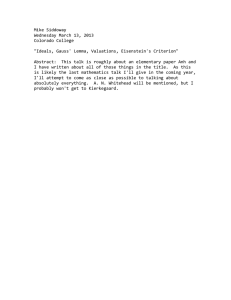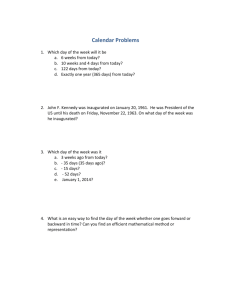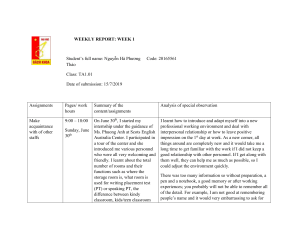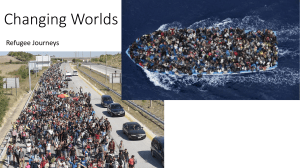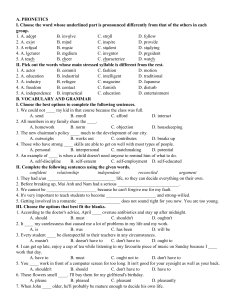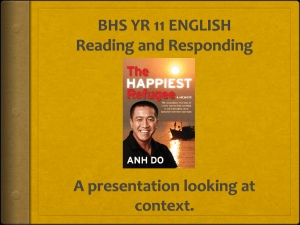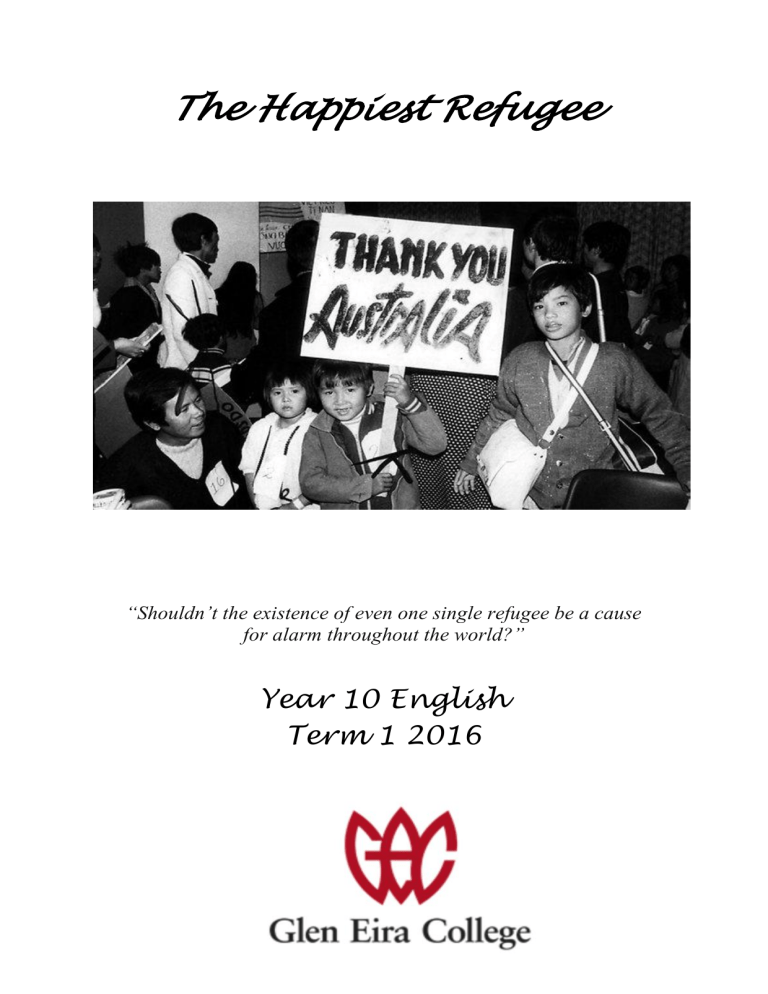
The Happiest Refugee “Shouldn’t the existence of even one single refugee be a cause for alarm throughout the world?” Year 10 English Term 1 2016 UNIT OBJECTIVE: Students will be able to: - explore and analyse the experiences of refugees, multiculturalism, and identity. - identify and discuss other main themes in the text, and apply them to the text and contemporary Australia. - respond to these concepts in written form. CONTEXT Who was involved in the Vietnam War? What was the attitude to communism in: - South Vietnam - North Vietnam - Australia What type of conflict was the Vietnam War? What was popular opinion around the Vietnam War in Australia? What was the effect of the Vietnam War on Australia? How would this opinion have impacted the way that Anh’s family was received in Australia? BACKGROUND Who is Anh Do? Anh Do (born 2 June 1977) is a Vietnamese-born Australian author, actor and comedian. He has appeared on many Australian TV shows such as Thank God You're Here and Good News Week, and was runner-up on Dancing With The Stars in 2007. He studied a combined Business Law degree at the University of Technology, Sydney. He is brother of film director Khoa Do and has acted in several of Khoa's films, including Footy Legends, which he co-wrote and produced. In 2012, his TV show Anh Does Vietnam began airing. Do and his family fled to Australia as refugees in 1980. We are going to study his 2010 autobiography, The Happiest Refugee, where Do tells of how his family fled Vietnam and survived five days in a leaky fishing boat nine and a half metres long and two metres wide. The Happiest Refugee has won many awards, including the 2011 Australian Book of the Year, Biography of the Year and Newcomer of the Year, as well as the Indie Book of the Year Award 2011, Non-fiction Indie Book of the Year 2011, and it was shortlisted for the 2011 NSW Premier's Literary Awards, Community Relations Commission Award. Historical Context VIETNAM WAR FACTS The Vietnam War and the Do family Anh’s family come from South Vietnam. During the war two of Anh’s uncles had fought beside American and Australian soldiers. When he war ended in 1975 they, like many others were imprisoned in communist “re-education” camps. After three years Anh’s father broke them out of the camp in an action that can only be described as courageous. After that the family pooled their money so 40 of them could leave Vietnam to avoid further persecution at the hands of the North Vietnamese. The Do family were not alone. Two million people sought to escape South Vietnam after the communist victory. Over ten years from 1976, 94,000 refugees from Laos, Cambodia and Vietnam settled in Australia. Many experienced the same traumatic journey as the Do family. The Definition of a Refugee International legal protection of refugees centres on a person meeting the criteria for refugee status as laid down in the 1951 Refugee Convention. Under Article 1(A)2, the term “refugee” shall apply to any person who: “...owing to well-founded fear of being persecuted for reasons of race, religion, nationality, membership of a particular social group or political opinion, is outside the country of his nationality and is unable or, owing to such fear, is unwilling to avail himself of the protection of that country; or who, not having a nationality and being outside the country of his former habitual residence as a result of such events, is unable or, owing to such fear, is unwilling to return to it.” Thus, according to this provision, refugees are defined by three basic characteristics: they are outside their country of origin or outside the country of their former habitual residence; they are unable or unwilling to avail themselves of the protection of that country owing to a well-founded fear of being persecuted; and the persecution feared is based on at least one of five grounds: race, religion, nationality, membership of a particular social group, or political opinion. It is important to stress that the term “asylum seekers” refers to persons, who have applied for asylum, but whose refugee status has not yet been determined. http://www.geneva-academy.ch/RULAC/international_refugee_law.php THE HAPPIEST REFUGEE CHAPTER QUESTIONS These questions are for us to consider as we read the memoir. You should also use them for revision prior to the exam. Prologue 1. “I’m flying down the Hume Highway at 130 kilometers an hour. I’ve lost control a few times but the brrrrrr of those white guide things on the side of the road keep me on track. A steering wheel wet from tears is a very slippery object,” so begins Anh Do’s memoir. a. What tense is this passage? (Past, present, or future?) b. What is the narrative voice? (First person, second person, third person?) 2. How old do you think Anh is during this recollection? Why? 3. Anh places us, his readers, in a privileged position, a god-like or omniscient position. We watch the events and can also hear Anh’s inner thoughts, like asides in a Shakespearean play. The first one is “Will he even recognise me?” How does this technique make Anh’s writing intriguing for his audience? 4. What are Anh’s first reactions on seeing his father? 5. What do we learn about the relationship between Anh and his father? 6. Why do you think he choose this incident to start his memoir? 7. What revelation does Anh have at the end of the Prologue? How does this make us want to read more? Extension and Enrichment – Memoirs Bear Grylls starts his memoir, Mud, Sweat and Tears (2011), with the lines: “The air temperature is minus twenty degrees. I wiggle my fingers but they’re still freezing cold. Old frostnip injuries never let you forget. I blame Everest for that.” \ Alan Alda begins his first autobiography, Never Have Your Dog Stuffed (2007), with the sentence: “My mother didn’t try to stab my father until I was six, but she must have shown signs of oddness before that.” 1. How many similarities between the three excerpts can you find? Outline them. 2. Which beginning do you find most interesting? Why? 3. Why do you think these authors have started their reflections in this manner? 4. What categories of events do you expect to find in an autobiography? Enrichment - Jot down three ideas about how to start your memoir. - Focus on which idea you could make most interesting for readers – this may be an event or period of time that has impacted your life significantly. - Imagine that your reflections are to be published in weekly installments in the Good Weekend section of The Age’s weekend edition. - Write a short prologue of your memoirs, taking into consideration the audience and text type. Vocabulary What’s new? What’s interesting? Chapter One: After the Fall 8. Anh starts Chapter One with the passage: “Downtown Saigon is a tangle of bikes, pedestrians and rickshaws. The year is 1976 and the Vietnam War has just ended. A crowd of people wait at the end of Phu Street, where the train tracks curve sharply around a bend.” a. What tense is this passage? (Past, present, or future?) b. What is the narrative voice? (First person, second person, third person?) 9. Why must we know the context of Anh’s family? 10. What happened to Anh’s Uncle Thanh?. (4-5) 11. Why do you think Anh’s Uncle Huy became a Jesuit priest when he eventually came to Sydney? (5-6) 12. How did Anh’s father rescue his wife’s brothers? What qualities did he demonstrate? (8) 13. How do these qualities contrast with those perceived in the Prologue? Extension and Enrichment – Context “A bloody and merciless war has just finished and the murky, ugly rules of a stain coloured jungle now apply.” (2) - What sort of language feature is this? - What image does this evoke of the ‘current’ Vietnam? Give three examples, mentioned since the beginning of the book, that highlight the desperate situation in South Vietnam in 1976. - Would these examples cause you to flee your country? Why? Would you break the law to ensure your safety? Enrichment Using one of the examples from above as a prompt, write a short letter to a loved one explaining why you have had to flee your country. What is happening and why? Vocabulary What’s new? What’s interesting? Chapter Two: Escape 14. Describe the boat aboard which Anh and his family escaped. (9) 15. Describe two trials that the escapees overcame. (12-17) 16. Attacked by two groups of pirates, outline three horrific events the escapees endured. (20 & 24) 17. How were they saved? (25-26) Extension and Enrichment – Refugees Painful are the memories of those who perished out at sea, Desperate for a better fate, In search of freedom where the sea await, As darkness hides the tiny boat full of people filled with hope. It seems to be such an endless night, With freedom nowhere in sight. With the raging storms springs the wildest winds, As it throws the boat and the waves crashed in And the rain pelts down, mixed with babies tears, Whilst the women prayed to escape their fears, So the tiny boat struggles through the night, As it battles all, to reach daylight, And dawn approaches, a new day begun, It’s the last time they, get to see the sun, When freedom comes at such a cost, When the boat and pirates, paths did cross, While the innocent they killed and raped, Where death awaits, with no escape, And the boat’s in chaos, as the lady’s screamed, And the hopes all crushed, with all her dreams, As their laughter drowns out her tortured cries, While her life departs as she closed her eyes, And their bodies scattered on the ocean floor, Where they searched for freedom but never reached the shore, As the spirits roamed across the seas at night, You can hear them cry, Goodbye people, no more freedom, no more light. Stephen Nguyen, 1982 The sister of the poet (a MG99 group leader) was a Catholic nun, and was lost at sea while fleeing Vietnam. He wrote this haunting poem in her honour. - What was the MG99? Head to http://www.abc.net.au/news/specials/theluckiest-refugees/ to discover more of a background to this story - What sort of feelings does this poem evoke? Which part of this poem affects you most? - What language features can you find in this poem? Enrichment Imagine you have fled your country, and you are on an overcrowded boat in the South China Sea. Write a short creative piece (poem, reflection, diary entry etc.) to create an idea of your experience. If you are stuck, try a “Five Senses” poem. Describe a topic with each of the five senses. Your topic could include emotions or concepts. Remember to add adjectives, comparisons, etc. o It smells like . . . o It tastes like . . . o It sounds like . . . o It feels like . . . o It looks like . . Vocabulary What’s new? What’s interesting? Chapter Three: Australia 18. In Chapter Three, after the traumatic events of coming to Australia, the great humour of Anh enters his reminiscences. Identify one humorous line in the first two pages of Chapter Three. 19. How does this change in tone keep the audience interested in his memoirs? 20. Anh mentions a phrase his parents often spoke when they arrived in Australia. What was it? (28 – 31) 21. What are three reasons for them to have said it? 22. How did Miss Buk (Miss Burke) profoundly help Anh’s family? Was it difficult for her to help them? What effect did her actions have on the Do family? (31) 23. What were two pieces of wisdom Anh learnt from his parents? (33) 24. What shocked Anh’s mother about Miss Buks’ children? How did her family differ to the Do family? (35) 25. Why did Anh consider his father to be a legend? Extension and Enrichment – Cultural Differences - Anh had a thick Vietnamese accent throughout primary school (45) o How does this affect him? o Is his school captain speech a formative experience? List the feelings you would have if you were speaking publicly in another language. Enrichment - When Anh’s family walk into the St. Vincent de Paul shop, they are overwhelmed by astonishment and gratitude. They continue to be amazed at their ‘luck’. o Write a short dialogue between two characters in the book discussing the differences between Vietnam and Australia – “What a great country!” o OR o Create a Venn diagram outlining the similarities and differences between Vietnam and Australia in regards to lifestyle (freedom, economy etc.) Vocabulary What’s new? What’s interesting? Chapter Four: The Farm 26. What are some of the experiences that Anh has at the family farm? Which one do you think was important in developing his character? 27. Anh’s father had a saying, “There’s only two times in life, there’s now and there’s too late.” What does this saying mean? Do you agree with the sentiment? (53) 28. What happens to the farm? What was Australia experiencing at the time? Extension and Enrichment – Endeavour - What does the success and eventual failure of the farm tell us about the values of Anh’s family? - Anh’s father allows them to have a budgie cage, yet the boys have to make it themselves. This is called experiential learning, or learning by doing. Was this a good idea? Is this different to “Anglo” families? o How do you learn? Write about one time that you had to learn how to do something by simply doing it. What were the challenges, and what was the outcome? (58) Enrichment - Animals often play important roles in our life, and we suffer their decline and loss. On page 56, Anh’s father has to kill Blackie. o Is there a difference between the way Anh’s father dealt with Blackie’s illness and how your family would have? o What are the cultural differences and/or similarities between your situations, and why do you think they exist? Write a short reflective piece on these issues. Vocabulary What’s new? What’s interesting? Chapter 5: Choosing a School & Chapter 6: The Spiral 29. How does the family make the decision on which high school to send Anh to? What factors do they take into consideration? 30. What sacrifices will need to be made? 31. What events prompted Anh’s father’s decline? 32. How does Anh feel about his father at this point? (72) Extension and Enrichment – Sacrifice Many refugee families work long hours and sacrifice a lot of money for their children to have the opportunities that they were not able to have. - What does the word sacrifice mean to you? - What are some sacrifices that your parent/guardian has made? - What are some sacrifices that you have made to help your family? How and why? Enrichment Do you think the sacrifices that Anh’s mother made to send him to St. Aloysius were worth it? Would Anh have been the same person if he had gone to the local high school? - Write an interview with Anh discussing these questions, and others that culd arise. Vocabulary What’s new? What’s interesting? Chapter 7: High School 33. What struggles did the family face once his father was gone? 34. What sort of student was Anh? 35. “‘Anh, you’re a very talented storyteller.’ She had no idea how far that one line of encouragement would take me.” (78-79.) How did Mrs Borny inspire Anh? 36. How does Anh try to make things easier for his mother? 37. Anh describes his experience of getting mugged. How did he get out of the situation? At the end of the story, what realization did he have? (91-94) 38. From pages 94 to 103, there are several stories - the Paper Run, Fin Boy, Trinity Chess Game, and Homeless Shelter episodes. Which is your favourite? Why? What do you learn about Anh? 39. What experiences has Anh had with racism? Extension and Enrichment – Identity The Kind Lions episode is a welcome and hilarious short story. (86-88) - How does Anh construct a humorous short story? - How is character established? - Does he know the climax he’s heading toward? Is there a twist? If so where in the story? How does the placement of the twist make the short story effective? Enrichment A lack of money affected Anh throughout his school career. What effect did this have on his identity? - Anh struggles between the identity he wants to have (and tries to portray to his teachers and classmates), and the identity he actually has. - What is his identity defined by? How? - Write a journal entry from Anh’s point of view, talking about and lamenting this identity struggle. Vocabulary What’s new? What’s interesting? Chapter 8: University 40. Anh meets Karen and writes about their first encounter in an endearing manner. What elements of his story are humorous? (111) 41. What epiphany does Anh outline on page 113? How is this similar to his father’s view on life from page 48? 42. On 116 – 118, Anh has a near death experience. What does he discover about his own and his mother’s values? 43. Anh’s mother suffers a terrible loss when her fifteen thousand dollar machines are stolen. How does she react to this event? (121 – 122). Extension and Enrichment – Identity Using your knowledge of his identity struggle in high school to inform your answer, how is Anh exploring and experimenting with his identity in this chapter? - List some examples of his ‘phases’ - Analyse the motivation behind each of these ‘phases’ – why do you think he was creating new identities? Enrichment At one point or another we all experiment with our identity, and high school and/or university is usually where that occurs! Ways to explore our identity include clothes, music, or food. - Imagine you live in a country where the Communist government has demanded that all citizens can only wear loose and dull coloured clothing, listen to State-made music, and eat State-rationed and assigned food. o Write a letter to an underground resistance movement, arguing your right to express your own identity – why is having the freedom to choose your identity important? o Bonus question - Do you think this restriction of freedom played a part in the huge exodus of refugees from Vietnam? Vocabulary What’s new? What’s interesting? Chapter 9: Career and Suzie 44. What did Anh give-up to pursue his ambition of becoming a stand-up comedian? What motivated him? (138) 45. What was an important ingredient in Anh’s success? (139) 46. When he won his first competition, what did he do with the prize money? What does this say about his values? (141) 47. How did Anh and Suzie’s relationship develop? (141- 142) a. Is humour important in a relationship? 48. Work places, like schools, are full of competing egos. How are Anh’s values challenged by Samantha’s priorities? (143 – 146) 49. On page 150, we are taken back to the incident that starts Anh’s memoir - the confrontation with his father after eight years of no communication between the two. a. What lines are repeated from the prologue? b. Why does he return to this episode at this point in his memoir? c. What effect does this structural choice have on you as a reader? 50. When Anh took Suzie to meet his father in Melbourne, what insight did Anh have about how memory works? (152) 51. Also, he refers to his father as “laughing, beautiful, [and] terribly flawed.” How many words can you name that describes having contradictory opinions at the same time? (152) 52. People often judge us on the way we present ourselves – how we dress, our haircuts, our choice of language. How did Anh find this out the hard way? (153) Were the shop assistants acting in a racist manner? 53. At Suzie and Anh’s engagement party, a number of kind cultural exchanges happen. Outline three interesting occurrences? (Pages 154 – 158) 54. Cultural differences may occur in both large and small issues – from world views to dining experiences. From pages 158 to 163, meals taken at Anh and Suzie’s family homes are humorously regaled. What are three interesting cultural learning experiences that take place? Extension and Enrichment – Language and Culture On page 157, Anh’s mother makes an emotional speech. This is the first time we ‘hear’ her voice in the text. - Does this change your opinion of Anh’s mother? - Reflecting on this, what does this excerpt highlight about the language barrier between cultures and how we judge people by how they speak? o What other instances in the book displays this language barrier? - Do you speak/learn another language? What are some of the barriers you face when talking with native speakers? Enrichment During Suzie and Anh’s wedding ceremony, Suzie gave a reading in Vietnamese. Why do you think she did this? What effect did this have on the audience? Write a short reflection on the link between language and cultural acceptance. How does language help to integrate someone into a new society, and how can it exclude them? Vocabulary What’s new? What’s interesting? Chapter 10: Life as a Comedian 55. What happens that outrages Suzie? 56. What does the incident on page 181 tell us about Anh? What does he gain from this experience? 57. Is there evidence in the book to suggest that Australia is a racist country? 58. What is the story of Uncle One that has haunted Anh’s father his entire life? (185) 59. How does Anh feel about his father at the end of this chapter? a. Knowing what you now know about Anh’s father and Uncle One, does this change your perception of Anh’s father? Why? Extension and Enrichment – Racism Anh maintains he has not experienced a lot of racism, but the fact remains that he has been discriminated against and made to feel different. How does Anh deal with these instances of racism? Enrichment Do you think racism is a problem in Australia? Why or why not? Write a persuasive piece arguing your opinion. Try to use current events as evidence in your piece Vocabulary What’s new? What’s interesting? Chapter 11: Charity & TV 60. “Do as much as you can to give back to this beautiful country that gave us a second chance?” (191) What charity work are the Do’s involved in and why is it important to them? 61. What happened on Australia Day 2005? 62. What TV shows has Anh appeared in? 63. What does Anh’s grandmother tell him about his grandfather and Uncle Six? Extension and Enrichment – Multiculturalism Why do you think it is significant that Khoa won YAOTY in 2005? How would their mother have felt? Why? How does their journey and experiences in Australia affect the significance of this award? Enrichment Write a speech accepting the YAOTY award from Khoa’s point of view. Take Khoa’s personality and previous statements into consideration What feelings would Khoa be experiencing? Who and/or what would he thank? Chapter 12: Going back to Vietnam 64. What does Anh experience on his return to Vietnam? (217) 65. How is Anh just like his father? (218-220) 66. Describe when two other members of Anh’s family make television appearances. How are the two contrasted? What does this contrast tell us about life? 67. How does Anh convince Khoa to see their father? Extension and Enrichment – Full Circle The chapter finishes with Anh and his family on a boat on a river at Bobbin Head National Park. Why has Anh done this? What is its significance? Enrichment Write a reflection on “The Happiest Refugee”, using the dot points below as a starting point. Within the text o What was your favourite part? Why? o Which chapter had the biggest impact on you? Why? o In what part of the book do we learn most about Anh? Beyond the text o What do you think was the most important idea in this text? o What new information did you learn from this text? About the text o Why do you think the author included humour? o What are some language features the author uses, and why did he use them?
